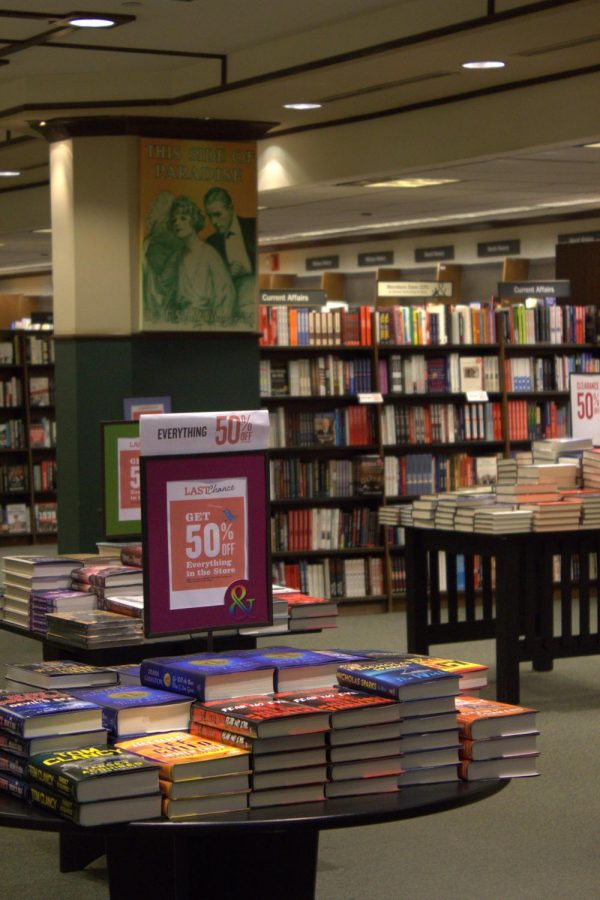Online shopping leads to local store closures
December 17, 2021
On the evening of Dec. 24, the Barnes & Noble store in the Old Orchard shopping center will lock its doors for the final time. They will close permanently after 27 years of occupying the building because the landlord did not renew their lease, according to a statement from the store’s staff. The statement explained that the owner of the mall, Unibail-Rodamco-Westfield, plans to redevelop the store’s site and lease the building to another store.
An increasing number of malls and department stores are closing down permanently, Business teacher Caitlin Korienek said. Nearly 200 department stores closed down in 2020, Abha Bhattarai wrote in the Washington Post. Kohl’s, Macy’s, and many other major brands reported steep sales declines over the past few years, contributing to closures across the country, Bhattarai said. These closures can be seen throughout the North Shore area, Korienek explained. She said that while shopping she has seen the impacts of this decline, and has noticed more empty lots and store closures than she used to.
“More and more, when [I] walk around malls [I] see vacancies or empty stores,” Korienek said. “Even [in] some [open] stores, there isn’t as much inventory as there [has] been in the past.”
Since 2016, nearly 40 percent of department stores in America have closed, Bhattarai wrote. She explained that many malls and department stores struggled financially before the pandemic, and the outbreak of Covid-19 further exacerbated their difficulties. John Blix, Business Education teacher, said there are several causes contributing to this decline, one of the most prominent being a surge in online shopping.
“Being a general merchandise retailer has been a very bad place to be in the last 20 years because of Amazon and people being able to go and get exactly what they want [online],” Blix said.
This shift to online shopping has proved damaging to malls as well, Blix added, because many large malls used department stores as a centerpiece for attracting customers.
“A lot of malls were anchored by one or two big department stores,” Blix said. “[They acted as] the heart and soul of the mall and brought people in, and then people lingered and walked around to the smaller stores in the mall.”
A significant impact of store closures is the detrimental effect on employees, Blix explained, as department stores generally employ large numbers of people who lose their jobs if the store goes under. There is also a lack of new experiences for online shoppers, Blix explained, which is one of the biggest consequences for consumers.
“When you go out to shop, you discover other things that maybe you weren’t looking for,” Blix said. “That disappears when you’re looking at a screen. You lose a sense of discovery.”
The atmosphere of the store is one of the things that junior Sonali Vyas will miss most when the Barnes & Noble in Old Orchard Shopping Center closes. She enjoyed shopping in person, she said and visited the store frequently with friends. Vyas added that she was very upset when she learned it would be closing.
“It was the best part of the mall,” Vyas said. “It was [where you would go] when you were at the mall but you didn’t want to shop.”
Because of the lack of in-person shopping experiences offered, the availability of products online can make online shopping more appealing to customers, Korienek explained. Services that offer expedited delivery make it favorable to order online, she said.
“The convenience for the consumer [is a benefit of online shopping], as [you do not have] to leave your house and [products] come directly to you,” Korienek said.
In addition to greater convenience, Blix explained that the rise of online shopping has been helpful for many small businesses.
“There are online businesses that could never afford to create in-person shops, and they’ve blossomed [online],” Blix said. “[The internet] is a real advantage to a lot of small entrepreneurs.”
Ultimately, Blix believes that some in-person general merchandise stores and shopping centers will always remain open. He thinks stores that are able to create an enjoyable experience will continue to attract customers, even as online shopping expands.
“I think [the shopping centers] that will survive will be those that focus on service and [the customer] experience,” Blix said. “I think there will always be a place for in-person shopping.”



